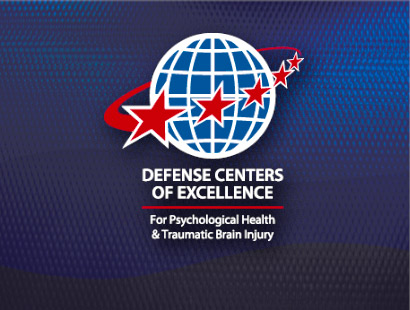Stress and Anxiety Following Traumatic Brain Injury (TBI)

DCoE Webinar Series (TBI): February 2015
Date/Time: February 12, 2015; 1-2:30 p.m. (EST)
Human behavior is a result of the constant interaction between the organism and its environment is a belief of the early 20th century psychologist Clark Hull (Freeman, Moore, & Freeman, 2009). Current research notes when injury or stress occurs, behavior reinforces the optimal biological conditions of survival.
This is just as true today when a service member survives both the stress of injury from a brain insult and the effects of the concussion/TBI when either stress or TBI may be repetitive in highly paced or frequent deployment environments. When TBI occurs on a battlefield, both a TBI and a stress/fear response occur.
If a threat or anxiety becomes overwhelming, the service member may revert to protective modes, including exacerbation of posttraumatic stress disorder, family conflict, alcohol or substance abuse, or other maladaptive reactions. Discussion will include a variety of evidence-based assessment and treatment strategies related to stress and anxiety following TBI.
LEARNING OBJECTIVES:
- Describe the complex interaction between the effects of stress and anxiety during the recovery course of TBI
- Examine and select strategies for treating co-morbid symptoms with the core symptoms of TBI
- Discuss the integration of evidence-based practices into the assessment of stress and anxiety following TBI
PRESENTERS:
C. Alan Hopewell, Ph.D., ABPP
Assistant Professor, Department of Psychiatry and Behavioral Health
University of North Texas Health Science Center
Ft. Worth, Tex.
MODERATOR:
Sherray L. Holland, PA-C
TBI Clinical Educator, Division of Education
Contract support to Defense and Veterans Brain Injury Center
Silver Spring, Md.
Reference
Freeman, S., Moore, B., & Freeman, A. (2009). Living and surviving in harm's way: A psychological treatment handbook for pre- and post-deployment of military personnel. New York: Taylor and Francis Group, LLL.
HOW TO REGISTER/ENROLL IN A COURSE:
- Login to your Duke Ethos Account at https://continuingeducation.dcri.duke.edu/stress-and-anxiety-following-traumatic-brain-injury-tbi
- Scroll down to the bottom of the page and click on “Take Course” and/or "Pre-Registration Questionnaire"
**IF YOU ARE A NEW USER, PLEASE BE SURE TO CLICK ON THE "PRE-REGISTRATION QUESTIONNAIRE" LINK AT THE BOTTOM OF THE PAGE, COMPLETE BEFORE REGISTERING FOR THE WEBINAR AND FOLLOW THE REMAINING STEPS BELOW.
- Once you have completed the "Pre-Registration Questionnaire" you will click on the link titled "This course is a dependency of Stress and Anxiety Following Traumatic Brain Injury (TBI)" which will return you to the course landing page.
- Scroll down and click on "Take Course", you are now registered for the course.
- Upon completion of registration, a confirmation email will be sent providing webinar event details.
IF YOU HAVE DIFFICULTY REGISTERING, PLEASE CONTACT THE SERVICE DESK AT: 919.668.8916.
TO VIEW THIS WEBINAR, PLEASE FOLLOW THE STEPS BELOW:
- Login to your Duke Ethos Account at https://continuingeducation.dcri.duke.edu/stress-and-anxiety-following-traumatic-brain-injury-tbi
- Scroll down to the bottom of the page and click on “Take Course”
- Click on the Webinar icon for Adobe Connect provided on the screen.
*If you have any technical issues accessing Adobe Connect, you may log in to Defense Connect Online (DCO) by clicking the DCO icon. You need only to sign on to either one of the sites to fully participate in the webinar.
- The webinar window will then appear on your screen.
- Login as a guest to view the webinar.
- Audio will NOT be provided via Adobe Connect. Use DHA Audio Conferencing Center - dial-in information to access the audio portion of the webinar. Participant 800-369-2075, International 312-470-7430; Participant pass code: 9942561.
TO COMPLETE ALL COURSE REQUIREMENTS AND CLAIM CONTINUING EDUCATION CREDITS:
- Complete the post-test.
- Complete the course evaluation.
- Attest to your hours of completion.
- Download your certificate.
CONTINUING EDUCATION:
Continuing education credit is available from Duke Medicine. You must register on or before Feb. 12, 2015, at 3 p.m. (EST) to qualify for the receipt of continuing education credit.
To qualify for receipt of continuing education credit for applicable webinars, eligible participants must create a profile in the Duke Medicine Learning Management System and register for the event on, or before, the event registration deadline. Complete responses to all pre-registration questions are required to be eligible to receive credit for attending this event. For guidance on creating a user account and event registration in the Duke Medicine Learning Management System site, please visit https://www.dcri.org/cee/education/ethosce-learning-center/EthosCE_Fundamentals.pdf
DCoE's awarding of continuing education credit is limited in scope to health care providers who actively provide psychological health and traumatic brain injury care to U.S. active-duty service members, reservists, National Guardsmen, military veterans and/or their families.
For additional details, please visit http://www.dcoe.mil/Libraries/Documents/DCoE-Monthly-Webinar-Series-Continuing-Education-Accreditation-April-2014.pdf.
Available Credit
- 1.50 AMA PRA Category 1 Credit(s)™
- 1.50 ANCC
- 1.50 Attendance
- 1.50 APA Credit
- 0.15 CEU
- 1.50 NASW credits
- 1.50 NBCC

 Facebook
Facebook X
X LinkedIn
LinkedIn Forward
Forward